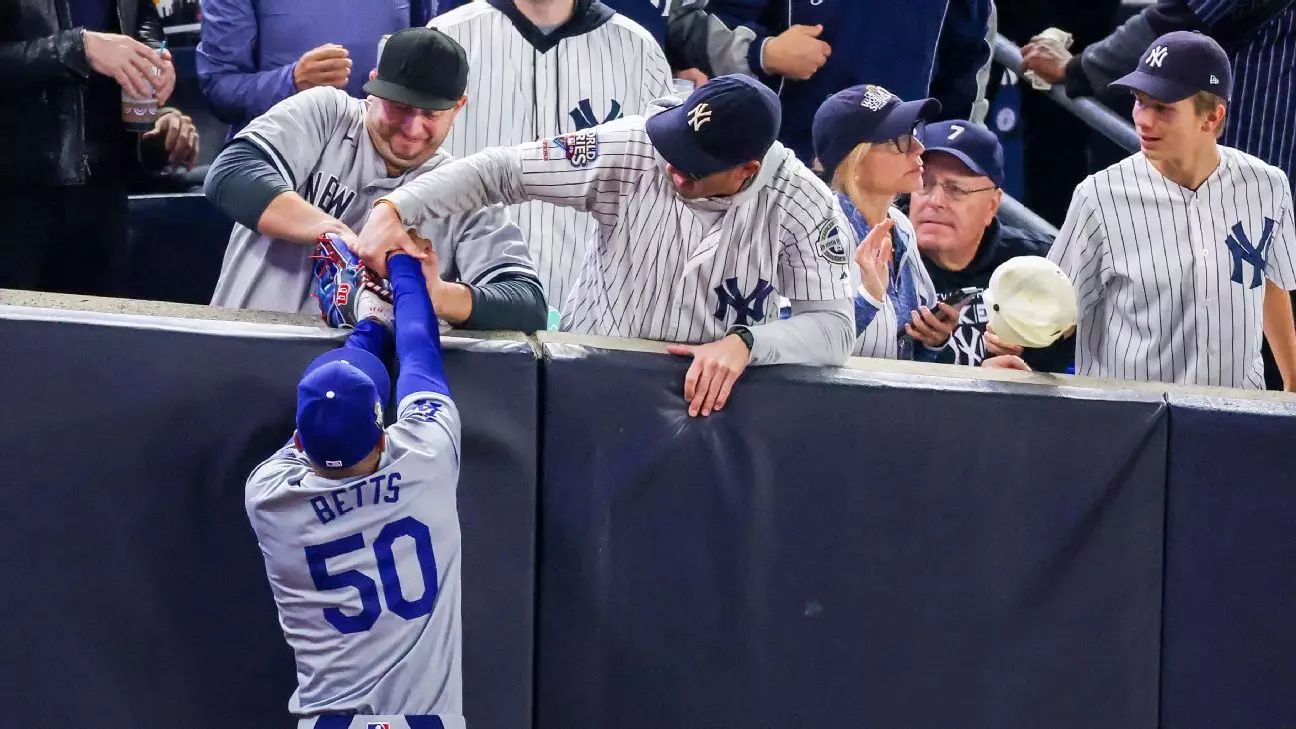Baseball is often celebrated as America’s pastime, drawing fans from all walks of life to partake in the anticipation and excitement of the game. However, that excitement can sometimes spill over the lines of acceptable behavior, as evidenced by a dramatic incident that occurred during Game 4 of the World Series at Yankee Stadium. This event not only sparked discussions about fan ethics but also raised questions about the responsibilities that accompany fandom.
The game saw a rather unusual scenario when Austin Capobianco, a devoted Yankees fan, engaged directly with Dodgers right fielder Mookie Betts. As Betts leapt to catch a foul ball from Gleyber Torres in the first inning, Capobianco reached over, prying the ball from Betts’ glove. This action was audacious, to say the least. Capobianco and his friend, John Peter, soon found themselves at the center of a chaotic moment that quickly escalated. Rather than celebrating a moment of sportsmanship, they were thrust into a situation that now puts their allegiance and behavior into question.
This incident highlights how deep the passion for sports can run, prompting some fans to act in ways that not only affect the game but also affect the athletes. Betts’ visible frustration during the episode was palpable. Despite his attempts to downplay the encounter, his reaction underscored the instinctive emotional investment that players have in every play, foul or otherwise.
Fans often walk a precarious line between enthusiasm and interference during games. The passion that drives them to attend a World Series game is arguably the same passion that led Capobianco to infamously pry a ball from Betts’ glove. Throughout baseball’s storied history, fan interference has had significant implications on games, leading to expert analyses that explore the ethics of fan behavior.
The story of Capobianco and Peter illustrates a troubling trend. Their decision to interact physically with a player raises questions about the moral implications of such actions. While the allure of aiding one’s team may be tempting, where should fans draw the line? For sports to be enjoyable—both for athletes and spectators—there must be an understanding of boundaries and the role of personal responsibility in maintaining the integrity of the game.
Following the incident, Capobianco and Peter were ejected from Yankee Stadium but given a glimmer of hope: they were told they could return for Game 5. Capobianco’s recognition of his misstep, where he stated, “I know when I’m in the wrong,” hints at a deeper understanding of personal accountability, a concept that is often lost amid the adrenaline rush of competitive sports. They didn’t intend to harm, but their actions disrupted a moment that was solely about the athletes on the field.
This event, though singular in nature, spark conversations among fans about their roles in sports. Do passionate actions taken in the heat of the moment reflect a misunderstood sense of camaraderie, or do they reveal a disconnect between fans and the fundamental respect owed to professional athletes? It’s a question many in the sports world must grapple with moving forward.
Mookie Betts’ post-game reflections reveal the resilience that athletes often exhibit after such incidents. By downplaying the impact of the ejection and focusing on the loss his team encountered, Betts exemplified the qualities of leadership that fans and aspiring players look up to. His comments serve as a reminder that while the squabble over a foul ball may be momentarily exciting, the ultimate goal remains winning the game.
In this age of viral moments and constant media scrutiny, fans must consider their place within the narrative of the game. While Capobianco’s actions may have inspired a brief buzz, the long-term implications of fan interaction warrant deeper consideration. As baseball continues to evolve, so too must the understanding of what it means to cheer for one’s team while respecting the game and its players. Therefore, as we move forward, let us celebrate the thrill of fan engagement but also remember the lines that should never be crossed.

